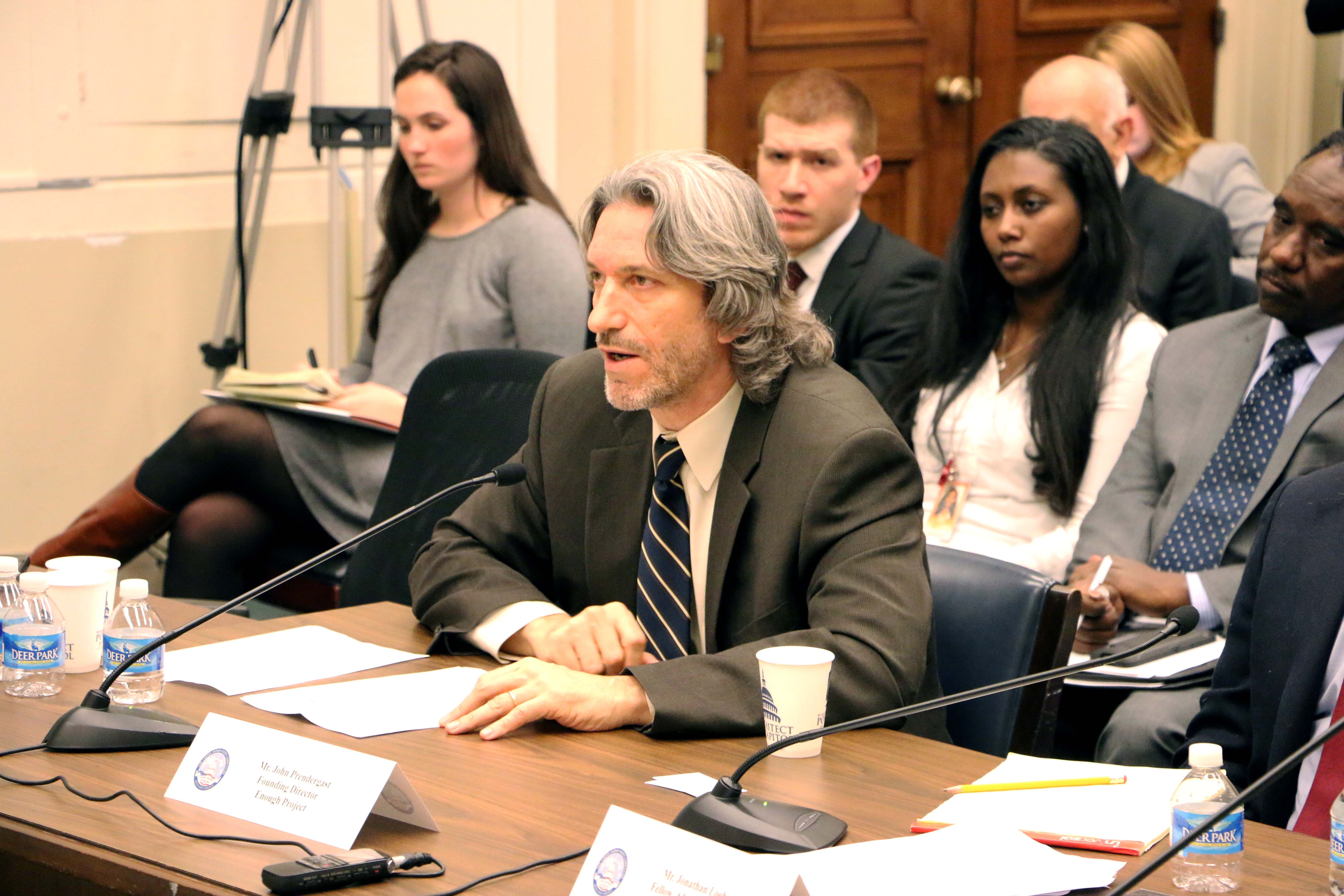
Editor's note: This blog was written by Enough Project Intern Anna Philibert.
On March 4, John Prendergast testified before Congress at a hearing held by the Tom Lantos Human Rights Commission: “Human Rights Violations in Sudan,” about the need to create leverage over the government of Khartoum to support human rights in Sudan. Commission Co-Chairs Jim McGovern (D-MA 2) and Joe Pitts (R-PA 16) opened the hearing. Chairman McGovern reminded the audience that this marked the fifth hearing on human rights violations in Sudan since the commission’s founding in 2008. Representative Pitts added that the situation has deteriorated to levels of violence similar to 2004. In early 2015, the United Nations estimated that 6.9 million people are in need of humanitarian assistance in Sudan.
In addition to John Prendergast, expert witnesses for this hearing included:
- Steven Feldstein, Deputy Assistant Secretary of the Bureau of Democracy, Human Rights and Labor;
- Catherine Wiesner, Deputy Assistant Secretary of the Bureau of Population Refugees and Migration;
- Former Representative Tom Andrews, President of United to End Genocide; and
- Jonathan Loeb, Fellow with Human Rights Watch.
In addition to Chairmen McGovern and Pitts, Representatives Jan Schakowsky (D-IL 9) and Sheila Jackson Lee (D-TX 18) attended the hearing.
John Prendergast’s testimony remarked on how the greatest opportunity for American leverage in Sudan is through targeted economic and financial pressure on the Khartoum government, including expanded and better enforcement of sanctions, and strong action taken against Sudan's conflict gold trade. He recommended that Sudanese gold be labeled as conflict-affected, and that the U.S. increase the scope of sanctions to apply to those who benefit from its trade in Sudan. Prendergast noted that sanctions should target the facilitators and enablers who carry out business with the Sudanese government. As he stated at one point,
"Sudan is exposed quite substantially to the international financial system, much of the international financial system goes through U.S. dollars, goes through New York, goes through London. These are tremendous potential pressure points and leverage that we could be using.”
Broadcast live streaming video on Ustream
On the first panel, Steven Feldstein spoke about his recent trip to Sudan, where he met with government officials, international aid workers, and members of civil society. People he met specifically mentioned their knowledge of the work of advocates, including the recent New York Times Op-ed, written by the Satellite Sentinel Project’s founders, George Clooney and John Prendergast, and Enough’s policy analyst Akshaya Kumar. Catherine A. Wiesner discussed the challenge it is for aid organizations to get access to the millions of people in Sudan who rely on their work. The recent bombing of a MSF hospital and restrictions on investigations of humanitarian violations have made it increasingly difficult for international organizations to access conflicted areas.
Opening the second panel, Tom Andrews urged Congress to expand and strengthen the effectiveness of sanctions on those who commit human rights violations in Sudan, to demand accountability from individuals and nations who aid President Bashir, and to introduce legislation that creates a comprehensive approach to the human rights violations in Sudan. Jonathan Loeb shared stories from a recent Human Rights Watch report on Sudanese soldiers who systematically raped 221 woman and girls in the north Darfur town of Tabit.
Following Prendergast’s testimony, Representative Schakowsky asked if there are corporate and private sector actors whose actions should be exposed, and Prendergast noted international banks, citing the precedent for action set by the record $8.9 billion fine against the bank BNP Paribas for its illegal transactions with Iran.
The hearing concluded with expressions of hope that the need for repeated hearings on human rights violations in Sudan would not continue, because the atrocities would end. In closing, Representative McGovern said,
"The message is clear; we are not going to forget this and we are not going away. And if the government of Sudan doesn’t want additional sanctions, then they ought to get with the program here and begin to respect the human rights of their own people.”
FOR MORE:
Photo credit: Erik Leaver, United to End Genocide.

